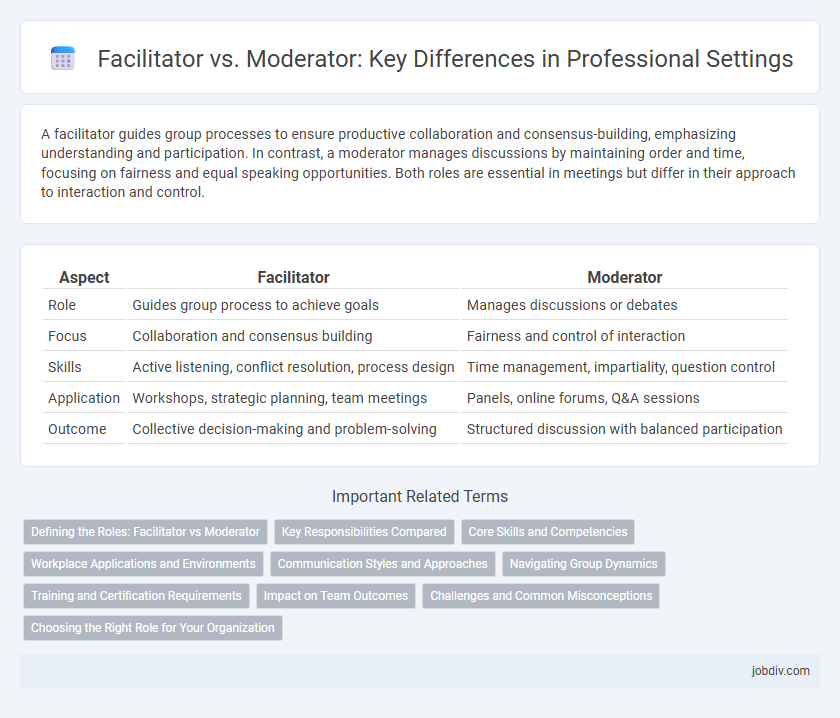A facilitator guides group processes to ensure productive collaboration and consensus-building, emphasizing understanding and participation. In contrast, a moderator manages discussions by maintaining order and time, focusing on fairness and equal speaking opportunities. Both roles are essential in meetings but differ in their approach to interaction and control.
Table of Comparison
| Aspect | Facilitator | Moderator |
|---|---|---|
| Role | Guides group process to achieve goals | Manages discussions or debates |
| Focus | Collaboration and consensus building | Fairness and control of interaction |
| Skills | Active listening, conflict resolution, process design | Time management, impartiality, question control |
| Application | Workshops, strategic planning, team meetings | Panels, online forums, Q&A sessions |
| Outcome | Collective decision-making and problem-solving | Structured discussion with balanced participation |
Defining the Roles: Facilitator vs Moderator
A facilitator guides group processes to enhance collaboration, ensuring all participants contribute and stay focused on achieving shared goals. A moderator manages discussions, enforcing rules, time limits, and maintaining order primarily in debates or panels. Understanding these distinctions is crucial for selecting the appropriate role to foster effective communication and decision-making in professional settings.
Key Responsibilities Compared
Facilitators guide group processes to achieve consensus and foster collaboration, emphasizing active listening, conflict resolution, and ensuring equal participation among members. Moderators primarily manage discussions, enforce rules, maintain order, and control the flow of dialogue during meetings or debates. Both roles require strong communication skills, but facilitators focus on process improvement while moderators concentrate on procedural oversight.
Core Skills and Competencies
Facilitators excel in guiding group processes, emphasizing strong communication, conflict resolution, and active listening skills to foster collaboration and consensus. Moderators specialize in managing discussions, demonstrating expertise in impartiality, time management, and controlling the flow of conversation to ensure balanced participation. Both roles require adaptability and emotional intelligence, but facilitators prioritize engagement and problem-solving, while moderators focus on structure and maintaining order.
Workplace Applications and Environments
Facilitators guide workplace discussions by fostering collaboration and ensuring all team members contribute to achieving shared goals, enhancing group problem-solving processes. Moderators manage the flow of meetings or online forums, maintaining order, enforcing rules, and keeping conversations on topic to optimize productivity. Effective use of facilitators and moderators in professional environments improves decision-making, team dynamics, and communication efficiency.
Communication Styles and Approaches
Facilitators prioritize inclusive communication by encouraging equal participation and active listening to foster collaborative problem-solving. Moderators maintain control over discussions through structured turn-taking and impartial guidance, ensuring adherence to rules and time limits. Both roles adapt their communication styles to manage group dynamics effectively, but facilitators emphasize consensus-building while moderators focus on orderly dialogue.
Navigating Group Dynamics
Facilitators skillfully guide group processes by fostering collaboration, managing conflicts, and ensuring balanced participation to achieve collective goals. Moderators primarily oversee discussions, maintaining structure, enforcing rules, and keeping conversations on track without influencing content direction. Effective navigation of group dynamics relies on the facilitator's emphasis on emotional intelligence and active listening, contrasting with the moderator's role in procedural control.
Training and Certification Requirements
Facilitators typically require specialized training in group dynamics, conflict resolution, and effective communication techniques, often supported by certification programs like the International Association of Facilitators (IAF) Certified Professional Facilitator. Moderators, especially in professional or online settings, need training in managing discussions, maintaining neutrality, and ensuring balanced participation, with certifications available from organizations such as the National Speakers Association or specific workshop facilitator courses. Both roles demand continuous professional development to enhance skills in steering conversations and achieving desired outcomes within corporate or educational environments.
Impact on Team Outcomes
Facilitators guide team processes by fostering collaboration and ensuring balanced participation, which enhances decision-making quality and consensus. Moderators maintain order during discussions and enforce rules, reducing conflicts and keeping conversations on track to meet objectives efficiently. Both roles significantly influence team outcomes by shaping communication dynamics and sustaining productive engagement.
Challenges and Common Misconceptions
Facilitators often face challenges in maintaining neutrality while encouraging diverse participation, whereas moderators struggle with managing conflicts and keeping discussions on track. A common misconception is that facilitators control the content, but their role is to guide the process, while moderators are mistakenly seen as unbiased enforcers despite their need to balance impartiality with rule enforcement. Understanding these distinctions clarifies expectations and maximizes the effectiveness of professional group interactions.
Choosing the Right Role for Your Organization
Selecting the appropriate role between facilitator and moderator depends on your organization's meeting objectives and group dynamics. A facilitator actively guides discussions to foster collaboration, solve problems, and achieve consensus, making them ideal for strategic planning sessions. Moderators primarily manage discussion flow and enforce rules during debates or panels, ensuring orderly communication and time management.
Facilitator vs Moderator Infographic

 jobdiv.com
jobdiv.com